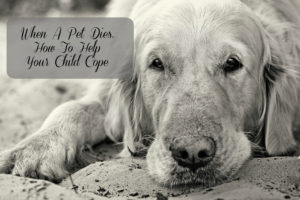This is not what I was planning to write about today. The unfortunate reality is that this is based on our current situation.
My Husband and I got a dog from a pound roughly 14 years ago, at which point she was fully grown maybe a year to 2 years old. She is a curious looking little mutt…cute in her own right I say while many others disagree. Boo was fearful and skittish. She settled in but forever remained a bit jumpy and neurotic. We loved her though. She moved with us three times and was right there as our family grew. She had a friend a lab mix (Dot) that I had before meeting my husband, and who was her elder by probably 4 years. These dogs have been a part of the family since before the kids were. They were all they had ever known.

Friendly dog and cat resting over green grass background
The lab mix passed away when our oldest was 3 and our youngest was an infant. It was difficult for the three-year-old. He had a lot of questions and was not quite clear initially that she would not be coming back. The permanency of death was too much for him to understand right off the bat. He was sad and remembered even when I thought it was far from his mind. For about a year every time someone would ask him about his dog he would go out of his way to explain that he really had 2 dogs and that one had died. To him, Dot still counted just as much as the one that was still here and wanted to make sure that everyone knew about her. She would not be forgotten.
The week before last I made a joking comment, one I have frequently made, that despite her age Boo would likely live forever. I have made this comment on numerous occasions because despite her age (now at least 15 years) she did not seem to even be slowing down very much. Everything abruptly changed over the past week. All the classic signs are there shortness of breath, loss of appetite, restlessness. She appears to be uncomfortable and likely experiencing cardiac problems.
Now the oldest is 7 and the youngest is 4. This time, it is going to be harder. The oldest has a clear grasp on the definite end that is death. He loves his doggy. The youngest will have many curious questions and need a lot of explanation. So now what…can’t hide from this one though I sure wish we could.

PREPARATION
It is ever so tempting as parents to shield our children from scary, sad, and generally unpleasant things. The impending death of a pet is pretty much the epitome of all of those concerns. I look at it this way though the entire time that you are aware that your pet may be in declining condition you are thinking things like, How will I know when it is time?, Is she suffering?, this is awful, etc… All of these thoughts are helping you to prepare for what is coming. Some might say that they do not want to upset the children before it is necessary and that they want them to enjoy all of their time possible with the pet. If that is the path that is taken however for a child the sudden passing comes out of the blue. Children are not necessarily aware of the pets declining condition unless you discuss it with them. They very well might think that the animal is quite fine and all of the sudden is being put to sleep. The shock and questions that brings to the table only serve to interfere in their processing of the loss.
Sometimes a pet is struck by a car or experiences a sudden problem. In those cases we have no choice but to forge ahead and deal with the shock and questions as they arise. I could have done my children a kindness by not making the playful comments about the expectation that this dog would possibly be everlasting. I really should have known better. In my defense I did expect her decline to be a slower and more gradual one when it appeared. I thought I would have the time to turn my rhetoric around.
It now seems likely I do not so we have begun having conversations like the ones below as I scramble to allow my children time to adjust to the idea that Boo may not be around much longer.
“We have noticed that _____ has not been doing as well lately. Have you noticed that she is walking slower, whimpering, not eating, _______? ”
“__________ is really quite old for a dog/cat/bunny. There is going to be a point when she is going to pass away/die. If she is really hurting it isn’t fair and we might have to help her find that peace.”
“When she is not around anymore it will be sad but we will know that she is not hurting anymore.”
It is important to be honest and forthcoming while being gentle. The children are likely to seek timelines that you probably cannot realistically give them. My approach has thus far been to explain that no one knows for certain what is going to happen but that I am mentioning it to them because it is my belief that it would be relatively soon and that as soon as I know more I will tell them. I will keep that promise.
I dislike the thought of them worrying about the dog in the meantime, but it feels unfair to me to not give them the opportunity to come to terms with something that is about to impact them so much.
Children feel that you value them when they are spoken to with honesty.

DURING
I am sure that someone will disagree, but it is my opinion that a child should not be present when the pet is being put to sleep or to witness the removal of a pet that has died. These are visions that can take a lasting place in the memory. It is my opinion that these visual memories can then start replaying in a troubling way when the child is grieving. If these images are allowed to be formed they may prevent the child from filling that mental space with a more positive visual memory of their pet.
Why does that matter? Well, when the child is crying about their pet and thinking in that moment I would rather that they are mentally picturing what it felt like to hug her and have her lick their face than to be picturing her falling asleep knowing that she would never wake up.
While it is my opinion that the child should not be present, I think it is beneficial for the child to be aware. I am of the opinion that it is harder on a child to lose a pet suddenly when they feel like it slipped out from under them. A loss of control feeling. For instance, I will be taking our dog to the vet tomorrow while my oldest is in school. If it were to turn out that she should be put to sleep because she is suffering a great deal then I will go get him from school to come and say goodbye. I would not want to have something done that impacted him this much without letting him know that it was going to happen. It would be difficult and I certainly hope that is not the case. It would not feel right to me, however, to just wait until after school to tell him something like that had been done in his absence without his knowing.
Aside from deciding to what extent to involve the child in the process, it is easy to know how to handle the situation during. It can be summed up in two words. Comfort and Support. It will be sad no matter what and it is often the child’s first encounter with the death of a loved one.

Close-up portrait of golden retriever dog with sad eyes
AFTER
Talk about it and then talk about it some more. It is sad. Maybe you have lost pets before and your perspective may be that it was just a pet especially now that you have children. Children do not have that perspective however and their pain may be so much greater than you realize. After the pet is gone is not a good time to bring up that you always had to nag them to walk them or feed them. It may be true and they may be asking you for another pet at that very moment, but refrain from making them feel like they did not do right by the pet they have lost. The last thing they need is to add a greater sense of guilt and remorse than they may already be experiencing.
Help your child memorialize the pet. Burying the ashes in a favorite place, framing and hanging a photograph, putting together a collage, making a holiday ornament are all very nice tributes. This is an important step for the child because it demonstrates the significance of the pet in their life and brings a peaceful closure. It occupies their mind and heart for a short while and lets them feel like they are actively resolving the loss.
Age 2-4:
The pet was primarily a fun furry play mate. In this age range there are likely to be questions about where the pet went and a lot of other questions that express a confusion about the permanency of death. Depending on your beliefs it is useful to describe the pet as having moved to another place of peace and that the pet cannot come back. This may be enough though it may require numerous reviews. In this age bracket it is normal for the sadness to come and go when the pet is or is not on the child’s mind.
Age 5 to preteen:
The pet was likely a true, deep heartfelt connection. The pet was a source of comfort, companionship, and confidant. In this age bracket the pet has been a huge part of the child’s life and likely has been there for most if not all of that life. This is a loss that they likely have nothing to compare it to and had no way of really understanding that this was coming and what it was going to feel like. It can be a bewildering experience and a level of pain that leaves them wondering if they will ever not hurt so badly again since they know at this age that the pet won’t be coming back. Talk about it and give them all of the time and support that they need. Encourage them to talk about the things that they may feel guilty about like forgetting to feed the pet or not walking the pet enough. They may be fixating on the fact they were mad at the pet for something shortly before they passed. Try to get all of those thoughts and feelings out in the open so that the child can be reassured that the pet loved them and felt loved. Talk to the child about how great that pet’s life was to have a family that loved them and a great place to live with food and toys. Start to talk about the next pet you might be able to rescue or get when the family is ready if this is an exciting thought to the child. My son loves the thought that he would have the opportunity to rescue another animal and now move on to giving that pet a great life. Other children might find the mere thought of another pet to be offensive initially.
Preteen-teenager:
Here again, the pet may have been around their whole life and be a deeply felt connection. They understand that death is real and permanent. They understand that they did not do anything to bring about the pet’s demise. They also may believe that they should not be as upset as they really are. They may want to be tough and feel foolish for how badly they are hurting about the loss of this pet. Again the best thing to do is to talk about it. They may report that they are not interested in participating the memorializing of the pet, the spreading of the ashes, or talking about the pet. Try to encourage them to participate regardless. The benefits may be unexpected and profound. They may or may not let you know that it is benefiting them, but as much as possible I would avoid allowing them to isolate with their feelings about the loss.

I will not rush to get another dog in Boo’s place but I know that the active tears will subside quickly. The desire to love and rescue another dog will be chewing on my son’s heals. Quicker than it may seem possible this pet will be a loving memory and a new love will be forging itself between little boys and another very fortunate doggy.
In the end as much as it hurts and as much as we would love to avoid it this is the type of loss that is a life lesson in perseverance and overcoming pain. The kind of lesson that lets us better understand the next time that while something hurts we can overcome it and we will be happy again.
It can be very challenging to find a new pet when you have kids and other pets to consider. How do you choose just one and the right one at that? More HERE

Shannon
Latest posts by Shannon (see all)
- Social Anxiety: More Than Shy - July 10, 2016
- 3 BIG Reasons To Give Children Specific Meaningful Praise - June 27, 2016
- Protecting Children From Sexual Predators: Safety Without Paranoia - June 6, 2016


This makes me cry… but is such a wonderful post. I only wish I’d seen it a couple weeks ago when both sets of grandparents to my kids (1 and 5) lost a dog, each within a week! We have a dog that I’m dreading this happening to and these tips are so helpful.
Oh I so hope that it does help! It is a life event that hurts in such a powerful way. Children never forget this loss. Which is the way it supposed to be. We come through it with all the poise and comfort we have to offer.
This is such a tough subject. Not looking forward to going through this with my kids. This is good information to have for future reference. It is hard to remember what each age group really understands what when it comes to losing a beloved pet. I wish pets could live as long as we do!
No doubt we wish they could stay with us forever!
Ahhhh! The Feels! Having lost two pets that were like my family, my children, you have no idea how much this meant to me. Thank you so so much for posting.
They live forever in our hearts.
We left behind our hamster graveyard when we moved….but we kept the memories and talked about them many, many times through the years. I am so glad you insist on telling the truth to children. I believe that is a real key to coping.
What great tips! My son is 3 and our lab mutt is 12, so I know this will be something we will have to go through with him.
I really hope it helps. The beforehand stuff can benefit so much when dealing with the grief after.
Sharing would be great thanks. I am just starting out.